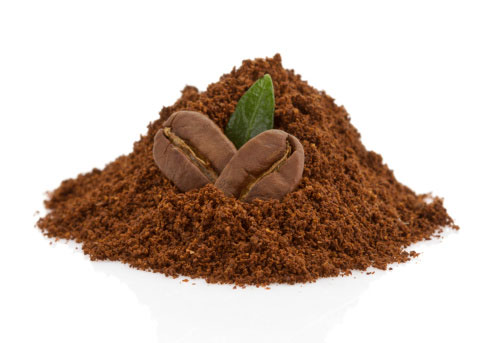Have you ever wondered whether it’s safe to toss coffee grounds down your sink or garbage disposal? You’re not alone.
Many coffee lovers face this dilemma every day, and the answer isn’t as straightforward as you might think. Imagine the convenience of quickly disposing of those used grounds without a second thought. But what if that habit could lead to unexpected plumbing issues or costly repairs?
Before you make your next cup of joe, take a moment to uncover the truth about coffee grounds and your kitchen plumbing. This insight could save you time, money, and headaches. Ready to find out more? Let’s dive into the details!

Credit: knightsmechanical.com
Impact On Plumbing
Coffee grounds seem harmless. But putting them down the sink or garbage disposal can cause plumbing issues. They can lead to clogs and damage pipes. Understanding these impacts can save you from costly repairs.
Potential For Clogs
Coffee grounds don’t dissolve in water. They tend to clump together. This clumping can block pipes over time. Even small amounts can build up and create a clog. The sink may drain slowly or stop draining completely.
Mixing coffee grounds with grease makes the problem worse. Grease solidifies and traps the grounds. This mix can form a stubborn clog in your plumbing.
Effects On Pipes
Coffee grounds are abrasive. Over time, they can scratch and wear down pipes. Pipes made of metal or plastic are susceptible. This abrasion can weaken the pipes, causing leaks.
Old pipes are more vulnerable. They might not handle the stress from coffee grounds. Weak pipes can burst and lead to water damage. Repairing such damage can be expensive.

Credit: www.reddit.com
Environmental Concerns
Coffee grounds are often seen as harmless waste. Yet, disposing of them improperly can harm the environment. Many people wonder if it is safe to put coffee grounds down the sink or garbage disposal. Understanding the environmental impact is crucial. Let’s explore why this common practice might not be eco-friendly.
Waste Management
Throwing coffee grounds into the sink can lead to clogs. Over time, these clogs can affect plumbing systems. This can increase maintenance costs. Waste management facilities can also struggle with coffee grounds. These small particles mix with other waste, complicating recycling efforts. Proper waste management helps preserve our planet. It ensures resources are used efficiently.
Eco-friendly Alternatives
There are better ways to dispose of coffee grounds. Composting is an excellent option. Coffee grounds enrich soil quality. They improve plant growth and reduce waste. Another alternative is using them for pest control in gardens. The grounds deter snails and slugs naturally. Repurposing coffee grounds can benefit the environment. It reduces waste and supports sustainability.
Proper Disposal Methods
Many people wonder how to properly dispose of coffee grounds. Dumping them down the sink or garbage disposal can lead to plumbing issues. Proper disposal methods can help avoid these problems. Two eco-friendly options include composting and trash disposal.
Composting
Composting coffee grounds is an excellent way to recycle them. Coffee grounds are rich in nitrogen, which benefits compost. They help in breaking down organic matter quickly. Simply add them to your compost bin. Mix them with other compost materials. Make sure to balance with carbon-rich items like leaves. This ensures a balanced compost mixture.
Trash Disposal
If composting isn’t an option, consider trash disposal. Place coffee grounds in a sealed bag. This prevents any leaks or mess. Dispose of them with regular trash. It is a simple and effective way. Keeps your plumbing safe from clogs.
Benefits Of Coffee Grounds
Coffee grounds can harm your sink or garbage disposal by causing clogs. Instead, use them in your garden. They enrich soil and deter pests, offering an eco-friendly alternative to disposal.
Coffee grounds are not just for making a delicious cup of coffee; they have a variety of benefits beyond the kitchen. Instead of tossing them down the sink or garbage disposal, you can find numerous uses for these humble leftovers. Whether you’re a plant enthusiast or someone battling garden pests, coffee grounds can be your ally. Let’s dive into some practical ways you can put coffee grounds to good use.Fertilizer Uses
You might be surprised to learn that coffee grounds can enhance your garden. They enrich the soil with essential nutrients like nitrogen, potassium, and phosphorus. These are vital for healthy plant growth. Sprinkle them directly onto the soil or mix them into your compost pile. They can improve soil structure and promote better drainage. Plus, their slightly acidic nature can be perfect for acid-loving plants like roses and blueberries.Pest Repellent Properties
Have you ever had trouble with snails or ants in your garden? Coffee grounds can help keep these pests at bay. Their texture is abrasive, making them a natural deterrent for slugs and snails. Spread them around your plants to create a protective barrier. Coffee grounds can also ward off ants due to their strong smell. Imagine enjoying your garden without the constant battle against tiny intruders. Before you toss those grounds away, ask yourself: How can they benefit your home and garden? By repurposing coffee grounds, you save money and contribute to environmental sustainability. So next time you’re brewing your morning cup, remember the possibilities that lie within those grounds.Plumbing Maintenance Tips
Avoid putting coffee grounds down the sink or garbage disposal. They can clump together, causing clogs. Regularly clean drains to prevent blockages and ensure smooth water flow.
Maintaining your plumbing system is crucial to ensure everything flows smoothly in your home. Missteps like putting coffee grounds down the sink or garbage disposal can lead to costly repairs. Plumbing maintenance is not just about avoiding clogs; it’s about ensuring the longevity and efficiency of your entire system. Let’s dive into some practical plumbing maintenance tips.Regular Pipe Checks
Regularly checking your pipes can prevent minor issues from becoming major problems. Look under sinks and in basements for leaks or moisture, which could signal a hidden issue. I’ve learned the hard way that catching a small leak early can save you from a flooded basement later. Listen for unusual sounds in your pipes. Bubbling or gurgling noises can indicate a blockage or air trapped in the system. Addressing these sounds promptly can prevent bigger issues like burst pipes.Effective Cleaning Practices
Keeping your pipes clean is essential. Avoid flushing coffee grounds, grease, and food scraps down the sink, as they can lead to stubborn clogs. Instead, compost food waste or dispose of it in the trash. Use natural cleaning solutions to maintain your pipes. A mixture of baking soda and vinegar can effectively clean drains without damaging your plumbing. This simple trick has saved me from countless plumber calls. If you’re using a garbage disposal, run cold water before and after use to help carry waste down the pipes. Cold water solidifies any grease, preventing it from sticking to the pipes. This small habit can significantly enhance the efficiency of your disposal system. Have you checked your pipes recently? Implementing these tips could save you time, money, and a major headache. Remember, proactive maintenance is always cheaper and easier than reactive repairs.
Credit: www.atomicplumbing.com
Frequently Asked Questions
Can Coffee Grounds Clog Your Sink?
Yes, coffee grounds can clog your sink. They can combine with grease and other debris, creating blockages. This can lead to slow drainage or even a complete clog. It’s best to dispose of coffee grounds in the trash or compost.
Is It Safe To Use Coffee Grounds In Garbage Disposal?
No, it’s not safe to use coffee grounds in garbage disposal. They can accumulate and form a sludge that clogs the pipes. This can cause damage to your plumbing system. It’s better to dispose of them in a more appropriate way.
How To Dispose Of Coffee Grounds Properly?
Dispose of coffee grounds by adding them to your compost pile or throwing them in the trash. Composting is environmentally friendly and enriches soil. Avoid putting them down the sink or garbage disposal to prevent clogs.
Can Coffee Grounds Harm Plumbing Systems?
Yes, coffee grounds can harm plumbing systems. They can cause blockages and damage pipes over time. This leads to costly repairs. Avoid flushing them down the sink or disposal.
Conclusion
Coffee grounds can clog your sink. They don’t dissolve in water. Throw them in the trash instead. Your plumbing will thank you. Using coffee grounds in garbage disposals is risky. They can stick to pipes. Over time, this leads to blockages.
Consider alternative uses. Use coffee grounds in compost or as garden fertilizer. They add nutrients to soil. Protect your pipes and help your garden. Simple steps can prevent plumbing issues. Maintain your sink with regular cleaning. Dispose of kitchen waste wisely.
Keep your home running smoothly. Avoid unnecessary repairs. Your wallet will appreciate it.
